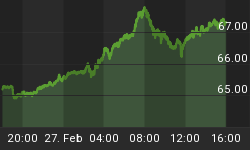It seems that nearly everyone is confounded by the record low bond yields that are prevalent across the globe today. If investors can correctly pinpoint the real reason behind these low sovereign debt yields, they will also be able to find a great parking place for their investment capital to weather the upcoming storm.
Wall Street cheerleaders are explaining that yields in the world's largest economy are falling for strictly "technical reasons." Specifically, they claim that there is a lack of supply of U.S. debt to purchase because deficits have come down so dramatically in past few years. But when you look at the data, you'll find this cannot be correct.
As a point of reference, the 10-Year Note in the United States is now at 2.5 percent, and yields on sovereign debt across the entire globe are likewise at, or very near, all-time record lows. This is true even if when looking back centuries.
In order to destroy the misinformation that there is a lack of supply of Treasuries, I gathered data during the four years when the U.S. actually had an annual budget surplus. The years were 1998 - 2001; and here are the deficit numbers as a percentage of GDP: 1998, positive 0.7 percent; 1999, positive 1.2 percent; 2000, positive 2.2 percent; 2001, positive 1.2 percent.
Those were the surpluses as a share of the economy during the late 1990s and early 2000s. In addition, the national debt back then ranged between $5.4 trillion in 1998, and increased to $5.9 trillion by 2001. And yet, given that we actually had budget surpluses and much lower levels of nominal debt and debt as a percentage of the economy, the U.S. 10-Year was trading from a range of 5.51 percent in 1998, to 5.03 percent by the end of 2001.
U.S. Note yields during the surplus years were more than twice as high as the yields seen today. Therefore, the misinformation being told to the American public that yields are at record lows due to a lack of supply issuance is preposterous. Indeed, sovereign debt levels amongst the developed worlds are at record levels; and yet, bond prices keep rising.
Today we have $17.5 trillion in debt, and the fiscal 2014 deficit is projected to be a negative 3 percent of GDP. And that nominal deficit number is estimated to be $500 billion. The 2014 deficit is being touted as an example of sound fiscal policy; but it should also be noted that the half-trillion deficit for this fiscal year is higher than any other budget deficit in American history outside of the Great Recession era-even when adjusted for inflation.
When people in the financial media try to tell the investment public that yields are down because there is no supply of debt, they should understand that the exact opposite is true. We have a $17.5 trillion national debt-a 250% increase in just over a decade--and a significant portion of that is short-term debt, which has to be rolled over every few weeks. The deficit is extremely large in nominal terms and double the level it was before the economy collapsed in 2008. Also, the amount of Treasury issuance is far greater today than it was 15 years ago.
We currently have falling growth rates in Japan, Europe, China, and posted a minus 1 percent annualized GDP print for Q1 here in the United States. These low yields are predicting that even beyond the slow growth that is evident right now, the risks are extremely high that the global economy will undergo a meltdown similar to what was experienced six years ago. The skyrocketing late payments on Chinese bank loans could be the catalyst that sets this chain reaction into motion.
The only legitimate reason why bond U.S. bond yields would be falling even as the Fed is getting out of the bond-buying business is that we are facing a contraction in global growth. It is not because of "technical reasons", "geopolitical concerns" or, especially not because "there are no bonds to buy."
And you can also throw away the argument that European bond yields are currently at or below those in the U.S.; therefore, global investors are simply doing a yield arbitrage. This reasoning really only serves to underscore the reality of declining economic growth throughout the developed world; and fails to explain how the U.S. economy can function with impunity from a globalized funk.
Unless Mario Draghi is about to make the ECB launch a QE program that would make the Fed blush, there is only one reason why the bond bubble has gone into hyper drive:
The truth is that the world is awash in sovereign debt. And the credit, currency and inflation risks associated with owning that debt has never be more elevated. Therefore, the only reason why yields are at historic lows is because they are predicting the chances of a meltdown in the global economy is extremely elevated at this time.















